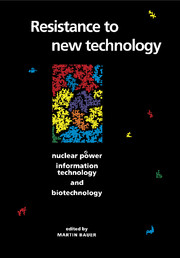Book contents
- Frontmatter
- Contents
- Contributors
- Preface
- 1 Resistance to new technology and its effects on nuclear power, information technology and biotechnology
- PART I Conceptual issues
- 2 The crisis of ‘Progress’
- 3 Reinterpreting ‘Luddism’: resistance to new technology in the British Industrial Revolution
- 4 The changeability of public opinions about new technology: assimilation effects in attitude surveys
- 5 ‘Technophobia’: a misleading conception of resistance to new technology
- PART II Case studies
- PART III International comparisons
- PART IV Comparisons of different technologies
- PART V Afterword
- Index
3 - Reinterpreting ‘Luddism’: resistance to new technology in the British Industrial Revolution
Published online by Cambridge University Press: 06 July 2010
- Frontmatter
- Contents
- Contributors
- Preface
- 1 Resistance to new technology and its effects on nuclear power, information technology and biotechnology
- PART I Conceptual issues
- 2 The crisis of ‘Progress’
- 3 Reinterpreting ‘Luddism’: resistance to new technology in the British Industrial Revolution
- 4 The changeability of public opinions about new technology: assimilation effects in attitude surveys
- 5 ‘Technophobia’: a misleading conception of resistance to new technology
- PART II Case studies
- PART III International comparisons
- PART IV Comparisons of different technologies
- PART V Afterword
- Index
Summary
The historiography of resistance to new technology, generically referred to as Luddism, in the British Industrial Revolution has been a curious one. Machine breaking plays little part in most economic history textbooks, labour's reaction to technological displacement, when noted at all, being seen as little more than an irritating and futile minor impediment to progress. Political and social historians have found the riotous crowd rather more interesting but they have tended to see Luddism as symptomatic of some other problem, economic depression or high food prices, rather than as direct hostility to technological change. Thus Briggs refers to the Luddites as the ‘helpless victims of distress’ (Briggs 1959, p. 182). Labour historians, though sympathetic to the problems faced, have often found that Luddism ill-accords with that Whiggish development of a ‘proper’ labour movement characterized by orderly trade unions, deemed the mark of progress. Machine breaking and riot are often seen as being very different and separate from orderly collective bargaining (see, for example, Cole & Postgate 1949, pp. 184–5; Thomis 1970, pp. 133–4; or Hunt 1981, p. 195). Even Hobsbawm, whose pioneering essay on the machine breakers showed how pre-industrial labour utilized machine breaking as a weapon, also saw industrial violence as an anachronism by the early nineteenth century (Hobsbawm 1968, pp. 5–22). Thus the Luddites have been too easily absorbed into popular notions as backwardlooking, blinkered obstructionists, men who failed to see the ineffable benefits of the Industrial Revolution and who were therefore justly and legitimately defeated.
- Type
- Chapter
- Information
- Resistance to New TechnologyNuclear Power, Information Technology and Biotechnology, pp. 57 - 80Publisher: Cambridge University PressPrint publication year: 1995
- 6
- Cited by



